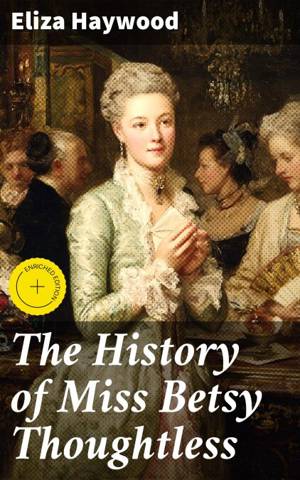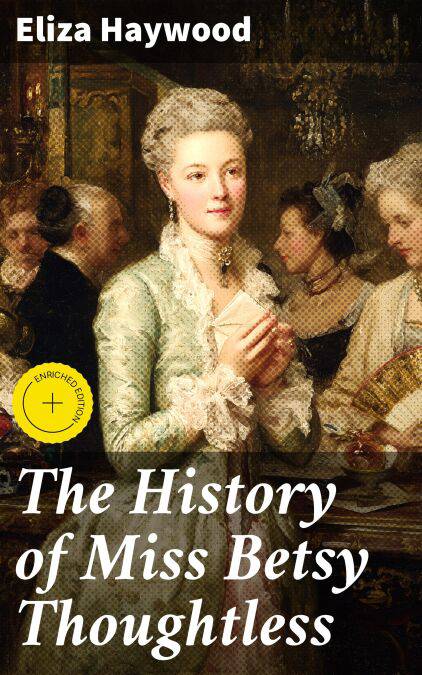
- Afhalen na 1 uur in een winkel met voorraad
- Gratis thuislevering in België vanaf € 30
- Ruim aanbod met 7 miljoen producten
- Afhalen na 1 uur in een winkel met voorraad
- Gratis thuislevering in België vanaf € 30
- Ruim aanbod met 7 miljoen producten
Zoeken
The History of Miss Betsy Thoughtless E-BOOK
Enriched edition. Historical Romance Novel
Eliza Haywood
E-book | Engels
€ 1,99
+ 1 punten
Uitvoering
Omschrijving
In "The History of Miss Betsy Thoughtless," Eliza Haywood crafts a vibrant narrative that intertwines themes of morality, gender, and social class within the complex web of 18th-century British society. The novel is characterized by its epistolary style, rich character development, and sharp wit, which offers a satirical yet earnest examination of a young woman's journey toward self-awareness amidst societal expectations. Betsy, the naive yet charming protagonist, embodies the conflicts between personal desires and societal norms, providing readers with an engaging exploration of the perils of thoughtless behavior. Eliza Haywood, a prominent figure in early feminist literature, was known for her keen insights into the roles of women in society. With a background as an actress and writer, Haywood witnessed firsthand the nuances of gender dynamics and social interaction. This wealth of experience informed her portrayal of Betsy and the vivid characters that populate her world, illustrating her passionate advocacy for women's autonomy and moral agency in an often constraining milieu. This novel is highly recommended for readers interested in early feminist writings and the historical novel genre. Haywood's deft combination of humor and social commentary not only entertains but also provokes thoughtful reflection on the evolving nature of gender roles, making it a timeless piece that resonates with contemporary audiences.
In this enriched edition, we have carefully created added value for your reading experience:
- A succinct Introduction situates the work's timeless appeal and themes.
- The Synopsis outlines the central plot, highlighting key developments without spoiling critical twists.
- A detailed Historical Context immerses you in the era's events and influences that shaped the writing.
- A thorough Analysis dissects symbols, motifs, and character arcs to unearth underlying meanings.
- Reflection questions prompt you to engage personally with the work's messages, connecting them to modern life.
- Hand‐picked Memorable Quotes shine a spotlight on moments of literary brilliance.
- Interactive footnotes clarify unusual references, historical allusions, and archaic phrases for an effortless, more informed read.
In this enriched edition, we have carefully created added value for your reading experience:
- A succinct Introduction situates the work's timeless appeal and themes.
- The Synopsis outlines the central plot, highlighting key developments without spoiling critical twists.
- A detailed Historical Context immerses you in the era's events and influences that shaped the writing.
- A thorough Analysis dissects symbols, motifs, and character arcs to unearth underlying meanings.
- Reflection questions prompt you to engage personally with the work's messages, connecting them to modern life.
- Hand‐picked Memorable Quotes shine a spotlight on moments of literary brilliance.
- Interactive footnotes clarify unusual references, historical allusions, and archaic phrases for an effortless, more informed read.
Specificaties
Betrokkenen
- Auteur(s):
- Uitgeverij:
Inhoud
- Aantal bladzijden:
- 462
- Taal:
- Engels
Eigenschappen
- Productcode (EAN):
- 8596547779698
- Verschijningsdatum:
- 15/12/2023
- Uitvoering:
- E-book
- Beveiligd met:
- Digital watermarking
- Formaat:
- ePub

Alleen bij Standaard Boekhandel
+ 1 punten op je klantenkaart van Standaard Boekhandel
Beoordelingen
We publiceren alleen reviews die voldoen aan de voorwaarden voor reviews. Bekijk onze voorwaarden voor reviews.








